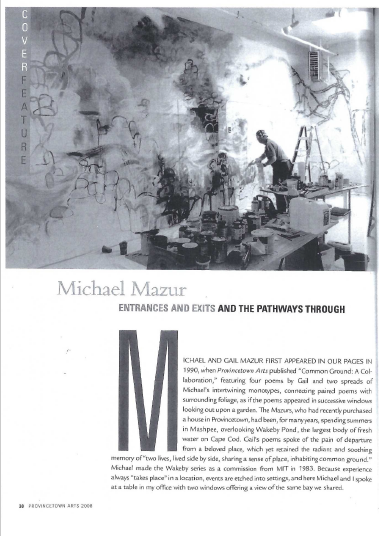Michael Mazur: Entrances and Exits and The Pathways Through
An interview by Christopher Busa
Excerpt:
Michael and Gail Mazur first appeared in our pages in 1990, when Provincetown Arts published “Common Ground: A Collaboration,” featuring four poems by Gail and two spreads of Michael’s intertwining monotypes, connecting paired poems with surrounding foliage, as if the poems appeared in successive windows looking out upon a garden. The Mazurs, who had recently purchased a house in Provincetown, had been, for many years, spending summers in Mashpee, overlooking Wakeby Pond, the largest body of fresh water on Cape Cod. Gail’s poems spoke of the pain of departure from a beloved place, which yet retained the radiant and soothing memory of “two lives, lived side by side, sharing a sense of place, inhabiting common ground.” Michael made the Wakeby series as a commission from MIT in 1983. Because experience always “takes place” in a location, events are etched into settings, and here Michael and I spoke at a table in my office with two windows offering a view of the same bay we shared.
And in an introduction to this issue, Michael Mazur wrote:
Studios are full of ghosts — ghosts of artists long gone, but not forgotten by relatives who hold on to their work spaces as memorials. When I visit them, I’m disconcerted by the sweet sorrow of their emptiness, their cleanliness and order. Yet the artist’s presence, nearly palpable, persists in the silent air. The studio is the laboratory, the workshop, the sanctuary and temple, the home and the retreat. It is the spiritual and physical core of the artist’s life. In 1964, Canadian pianist Glenn Gould gave up the concert stage and withdrew into his recording studio, where he invented a new way to present his interpretive performances. He described his recording studio as “womblike,” as a place “where time turns in upon itself,” where he could create art “with its own laws and its own liberties.”
Originally published in Provincetown Arts, volume 23 annual issue 2008-2009. Download a PDF version of the article.

